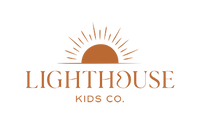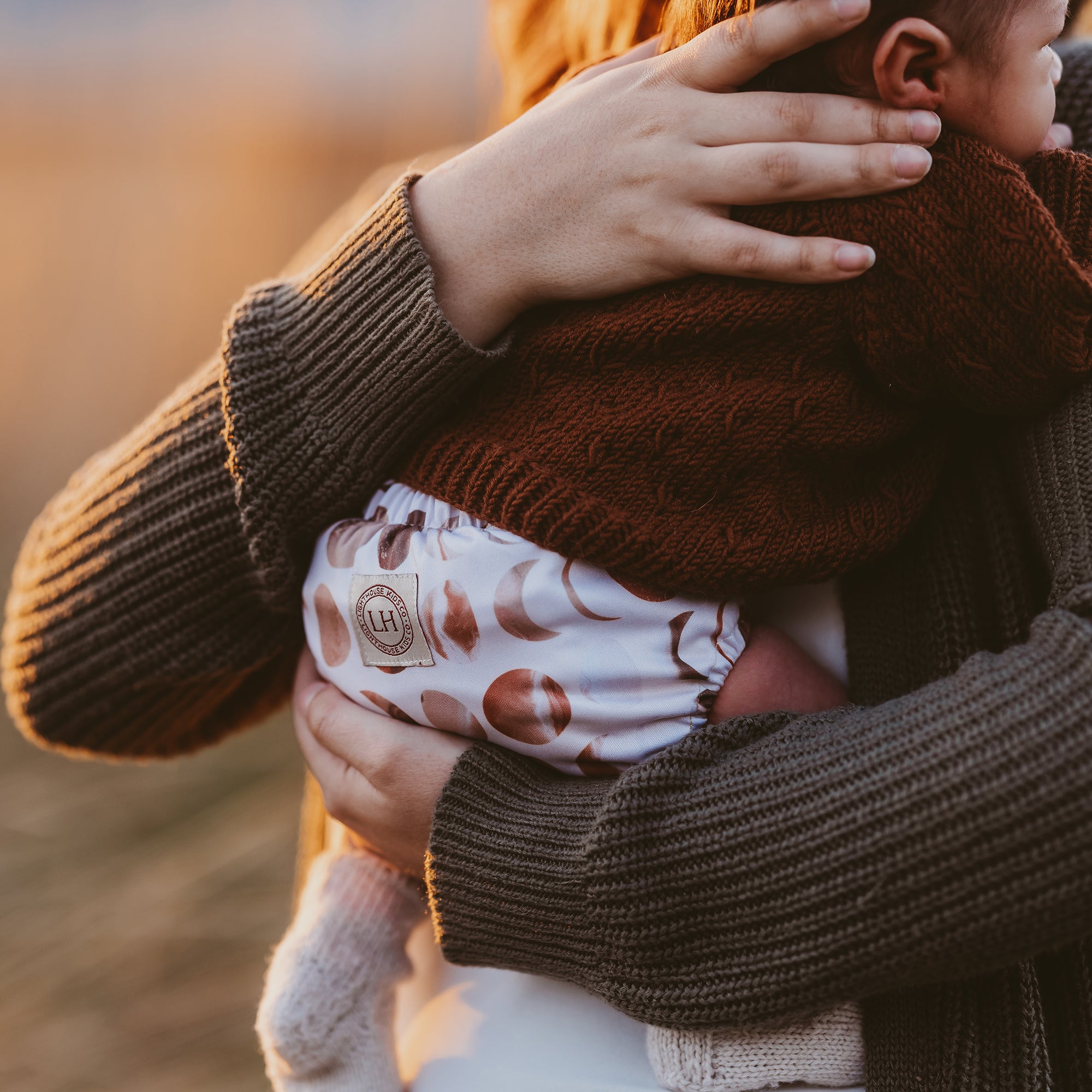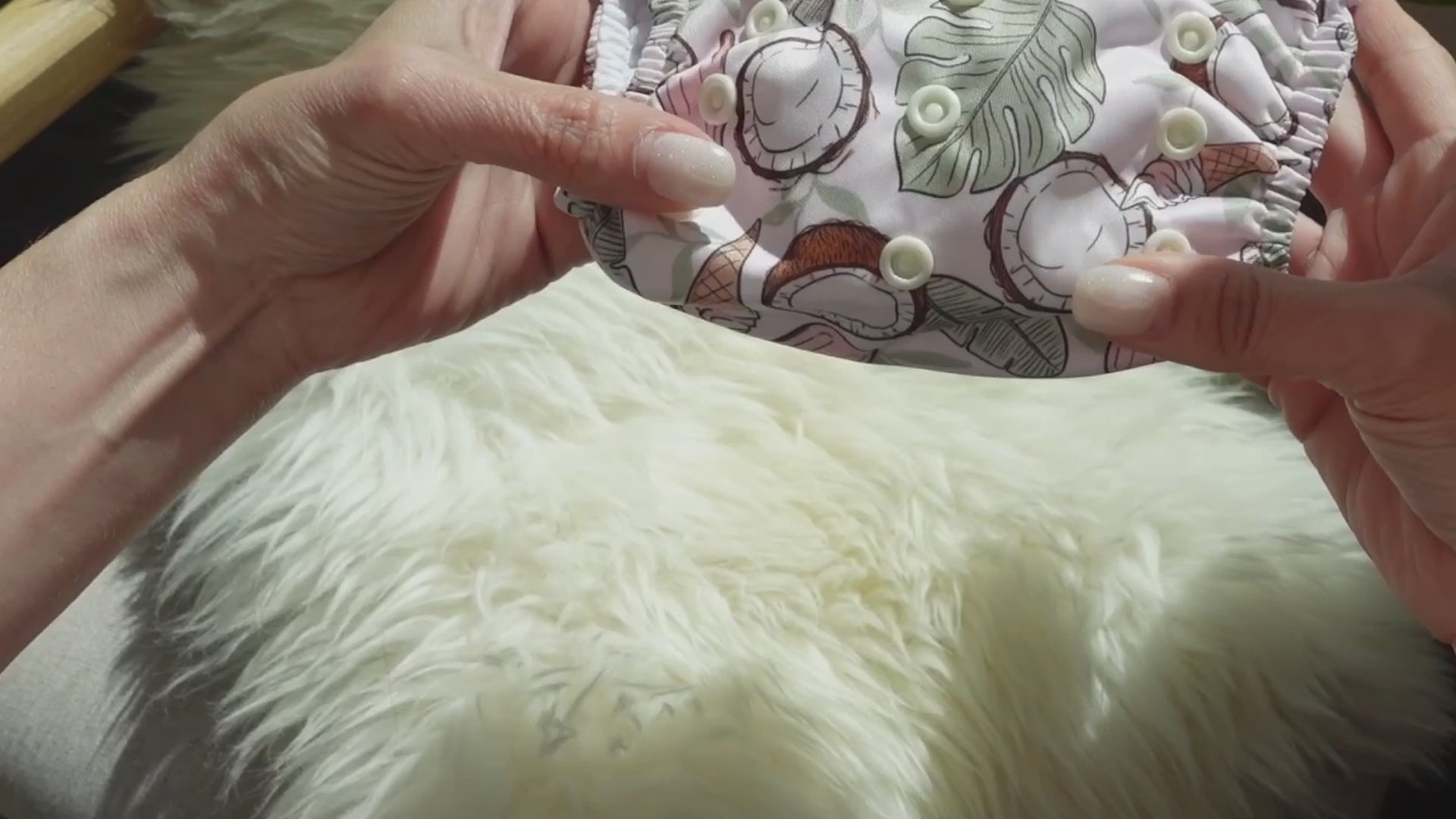A Comprehensive Guide to Cloth Diapering for Beginners
Cloth diapering has grown in popularity among new parents because of their financial savings, cute patterns and chemical-free diapering experience. It's not uncommon, especially for Millenials and Gen Z parents to use cloth diapers on their babies.
Why Choose Cloth Diapers?
Cloth diapers offer several advantages over disposables. They are environmentally friendly, reduce waste, and can be more cost-effective in the long run. Cloth diapers also come in various styles and materials, offering options for different preferences and needs. Many parents find that cloth diapers can lead to fewer diaper rashes and are more comfortable for their babies.
Types of Cloth Diapers
Understanding the different types of cloth diapers is crucial for making the right choice for your family. Here are the main types, along with their pros and cons:
All-in-One Diapers (AIOs):
- Pros: AIO diapers are the easiest to use, as they function similarly to disposable diapers. They are great for caregivers or daycare situations.
- Cons: They are more expensive because all parts of the diaper are included.
All-in-Two Diapers (AI2 Cloth Diapers/Cover Diapers):
- Pros: These diapers have a snap-in insert, allowing the cover to be reused if it's not soiled. The inserts can be customized for any type of absorption needed.
- Cons: Slightly more difficult to put together and may require unsnapping inserts before washing.
Pocket Cloth Diapers:
- Pros: These diapers have a pocket where you can stuff the inserts and choose how absorbent your diaper needs to be. Because the inserts come separate in the wash, pocket diapers tend to dry faster.
- Cons: Stuffing and unstuffing cloth diapers can take a long time and ads an extra step to the laundry routine.
Fitted Diapers:
- Pros: Excellent for overnight use because of their high absorbency. They do need a waterproof cover, and most fitted diapers keep the baby wet.
- Cons: They are more expensive and involve two steps (diaper plus cover) during changes.
Preflat Diapers:
- Pros: Preflats are cost-effective, versatile, durable, and dry quickly. Preflats can be folded and shaped in various ways to fit the baby's body.
- Cons: They have a steeper learning curve and require a waterproof cover.
Flat Diapers:
- Pros: The most economical option is flat diapers, essentially large squares of fabric that can be folded to fit any baby and situation.
- Cons: They require a waterproof cover with the highest learning curve for folding techniques.
Essential Cloth Diaper Accessories
To make cloth diapering successful and convenient, you'll need some essential accessories:
- Diaper Pail and Liners: A pail with a washable liner is ideal for storing soiled diapers until laundry day.
- Wet Bags: These are waterproof bags that can hold dirty diapers when you're out and about.
- Cloth Wipes: Using cloth wipes alongside cloth diapers can be more economical and eco-friendly.
- Diaper Sprayer: This attaches to your toilet and makes rinsing solid waste from diapers easier.
- Drying Racks or Clotheslines: These are used for air drying diapers, which helps prolong their lifespan.
Washing Cloth Diapers
Washing cloth diapers properly is key to maintaining their absorbency and longevity. Here's a general washing routine:
- Pre-Wash: Run a cold rinse or short wash without detergent to remove any waste.
- Main Wash: Use a hot water cycle with a recommended amount of cloth-diaper-friendly detergent.
- Rinse: Follow up with an extra rinse to ensure all detergent is removed from the diaper fabric.
- Dry: Line drying is preferred to extend the life of your cloth diapers, but using a dryer on low heat is fine.
How Do I Know Which Type of Cloth Diaper is right for me?
1. Think About Your Daily Life
First, think about your daily routine. All-in-One (AIO) diapers might be best if you're busy and need something easy. They are the most like disposable diapers and are simple to use. They have a built-in absorbent layer and a waterproof outer layer, so changing them is quick and easy.
If you want to save money and don’t mind more work, prefold or flat diapers could be the right choice. These need to be folded and used with a cover, but they are flexible and budget-friendly.
2. Look at Your Budget
Cloth diapers can cost more at first but save you money over time. Your budget will help you decide which type to buy. AIOs and pocket diapers cost more each, but they are easy to use. Prefolds, flats, and covers are cheaper options.
For a good middle option, consider All-in-Two (AI2) systems. They have a waterproof cover and separate inserts that you can change out, making them more affordable over time.
3. Think About Your Baby’s Needs
Your baby's needs are very important when choosing cloth diapers. If your baby has sensitive skin, look for diapers made from natural materials like organic cotton or bamboo. Fitted diapers with these materials are great for nighttime because they absorb well and are breathable, however, they do keep baby wet.
If your baby pees a lot, you might need diapers with extra absorbency. Pocket diapers let you add more inserts for more absorption, which is great for nighttime or long trips.
4. Ease of Use and Cleaning
Think about how easy the diapers are to use and clean. AIOs and pocket diapers are simple to use and clean, making them good for new parents. They have snaps or Velcro to fit your baby well as they grow.
If you don’t mind a little extra work, AI2s or hybrid diapers (using reusable covers with reusable or disposable inserts) might be a good choice. They offer flexibility and can make laundry easier since only the inserts need washing often.
5. Try Before You Buy
Before buying a lot of one kind of diaper, try a few different types and brands. Many stores let you test different styles with trial programs or sample packs. This helps you see what works best for your baby and your routine without spending much money.
Troubleshooting Common Issues
- Leaks: Ensure a proper fit, as leaks often result from poor fitting. Check that the diaper is snug around the legs and waist without being too tight.
- Stains: Sun-drying your diapers can help naturally bleach out stains.
- Smells: If diapers have a persistent odor, it may indicate detergent buildup. Running them through an extra rinse cycle or occasionally stripping the diapers can help.
Tips for Success
- Start Small: Before investing in a full collection, begin with a small stash to see what works best for your baby and lifestyle.
- Stay Organized: Keep your diapering area tidy and well-stocked to make changes quick and easy.
- Be Patient. Cloth diapering has a learning curve, so give yourself and your baby time to adjust.
Conclusion
At Lighthouse Kids Co. we know that cloth diapering can initially seem overwhelming, but with the right knowledge and preparation, it becomes a rewarding and manageable part of parenting.
By choosing the right type of diapers, acquiring essential accessories, and following proper washing routines, you'll find that cloth diapering not only benefits the environment but also your wallet and your baby's comfort.




































